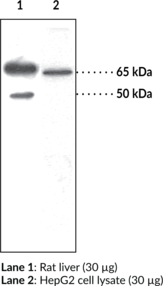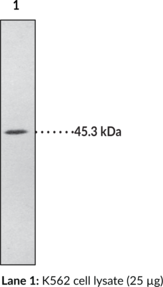Description
The activating transcription factor 2 (ATF2; also called CRE-BP1) binds to both AP-1 and CRE DNA response elements and is a member of the ATF/CREB family of leucine zipper proteins.{14435} ATF2 has been implicated in the transcriptional regulation of a number of genes including cytokines, cell cycle control, and apoptosis. Various forms of cellular stress, including inflammatory cytokines and UV irradiation, stimulate the transcriptional activity of ATF2.{14433,14436} Stress induced ATF-dependent transcription is dependent on phosphorylation of ATF.{14432,14436} Serine 490 and serine 498 are novel phosphorylation sites on ATF that have recently been identified. ATF2 is particularly abundant in the brain and the ATF2 family of transcription factors is considered an important substrate of signals upstream of the activation of genes associated with neuronal growth and differentiation.{14339} ATF expression has also been linked to depression in humans.{14434}
Synonyms: Activating Transcription Factor 2
Immunogen: synthetic phosphopeptide corresponding to amino acid residues surrounding phospho-Ser490,498 of human ATF2
Formulation: Peptide affinity-purified antibody
Isotype:
Applications: WB and IHC (frozen sections)
Origin: Animal/Rabbit
Stability: 365 days
Application|Immunohistochemistry||Application|Western Blot||Product Type|Antibodies|Polyclonal Antibodies||Research Area|Epigenetics, Transcription, & Translation|Transcription Factors||Research Area|Neuroscience|Behavioral Neuroscience|Depression


